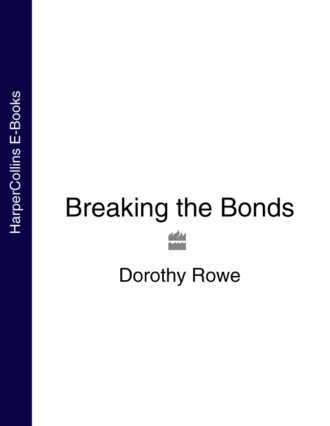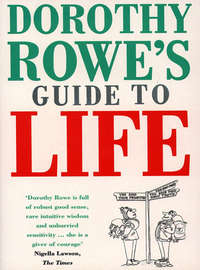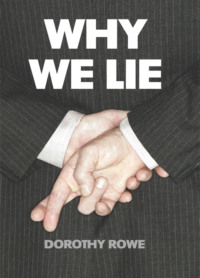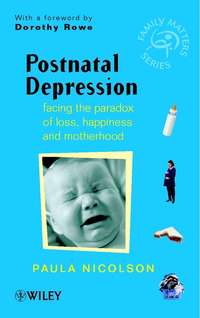
Полная версия
Breaking the Bonds
We are brave in the way we keep on going. We get up and go to work, no matter that our work is dull and unrewarding or demanding and stressful. We go on cleaning, cooking and looking after our children, knowing that many of the things we would like for ourselves and our children are not going to come our way. We go on trying to make our children brave by telling them that they are wonderful and that the future is opening up before them full of promise. We try not to tell them that their future might be tough and miserable, even though we fear it may be so. We go on loving one another, even though we know that out of that love will come the terrible pain of separation and loss.
Sometimes we lose our nerve. Sometimes our courage falters, and then we feel great fear. This happens when we lose confidence in ourselves and we find that there is an unacceptable discrepancy between what we thought our life would be and what it actually is.
Such a discovery is made by just about all of us at some point in our lives. When it does, we feel an immense fear which threatens to overwhelm and annihilate us. One way of dealing with this fear is by locking ourselves in the prison of depression. In there we can shut out other disturbances and give ourselves time to think things through and so come to terms with the discrepancy between what our life is and what we want it to be.
For some of us, coming to terms with the discrepancy and building another life is not too difficult, and so our period of depression is brief. However, for others of us the task is much more difficult. So much more has been staked and lost, so much time and effort has been wasted, and so few alternatives for the future are on offer. Most of all, if you have grown up believing that you are bad and unacceptable and that you have to work hard to be good, then in the prison of depression you can doubt that you have the right to change your life and to claim something for yourself. Thus your sojourn in the prison of depression goes on, until you can discover in yourself that sense of intrinsic acceptance and worth with which you were born.
This is not an easy thing to do because you have been told so many confusing things, not just by psychiatrists, but in the past by your parents and teachers, and in the present by people who want you to be the sort of person they want you to be.
Many people, not just psychiatrists, want to believe that depression is a physical illness.
If you are depressed and believe that it is a physical illness you may be holding this belief because it allows you to be irresponsible – no matter what you do, you can say, ‘I cannot help what I do, I am ill’. Or perhaps you believe depression is a physical illness because you are trapped in an impossible situation and being depressed is the only form of escape that you can find. Or perhaps you have been brought up to believe that you must never question what anyone in a position of authority says, and so if psychiatrists, backed by the whole medical profession, say that depression is a physical illness, you believe them without question.
Many people want to believe that depression is a physical illness because that allows them to ignore the suffering of other people and the complexities of life. It requires very little mental effort to think, ‘Depression is a physical illness’. Whereas to understand how we think, feel and act, how we affect and are affected by the people around us, how we respond to and are affected by the customs and beliefs attached to our gender, dass, race, religion and nationality, and how we respond to and are affected by the propaganda that we are subjected to and the political, economic and ecological changes in the world we live in requires considerable mental effort and a tolerance of uncertainty. To say, ‘Depression is a physical illness’ requires one sentence. To describe the multitude of matters which are relevant to our experience of depression requires many sentences, indeed, a large book.
The aim of this book is to help you sort out this confusion and to be a signpost for your journey out of the prison of depression. Depression is not an illness. It is an experience out of which we can gain greater understanding of ourselves and other people.
My friend Pat Wakeling, a psychiatrist who, having found that the treatment his colleagues gave him for his depression did not work, had to find his own way out of the prison, wrote:
Depression is not – as I have eventually and painfully learned – something to sweep under the carpet: to deny, to forget. It is an experience that brings great misery and causes a great waste of time, but it can be, if one is fortunate, a source of personal wisdom and worth more than a hundred philosophies.13
This book is a distillation of my work not just on depression but on all the suffering which we can encounter. In it you will hear the voices of some of the people who have talked to me over the last twenty years, people living in the United States, Britain and Australia. To them I give my gratitude and love.
1 An Ordinary Story
‘My family insisted I see a psychiatrist. So I went along expecting to have to tell him all about my life, but all he said was, “We don’t need to go into all that. You’re obviously depressed”, and he prescribed me some pills. That wasn’t what I wanted at all.’
Pat looked tired and much older than her forty-five years. She had read my book. Beyond Fear, and had written to me to say that she would like to talk to me because in that book I had described what she was going through – experiences of terrible fear and a sense of despairing and painful isolation.
So now she sat on my sofa and diffidently and simply told me her story.
She was a doctor’s daughter and had wanted to be a doctor too. But her father had said that medicine was not a profession for a woman. So she trained as a nurse and met Simon, a medical student, and fell in love. They planned to marry, but Simon was killed in a car accident.
Later she married one of her patients, a Korean veteran who had acquired the habit of drinking to maintain his courage, a habit which he did not relinquish after the war. For ten years Pat tried to maintain her marriage for the sake of her son, but eventually had to admit failure. She was offered the chance to train as a teacher and, even though this, like all the jobs she had done previously, in no way stretched her ability, she was glad to have a secure job which allowed her plenty of time for her son. Soon, though, there were other demands on her time. Her parents were now old and infirm, and her sisters had compelling reasons why they could not look after them. So Pat nursed her father and then her mother through long, painful, and finally fatal illnesses.
When Pat was a child she had enjoyed drawing and painting, but her parents and teachers discouraged her. Her parents had belittled her efforts, and her teachers told her she could not study both art and science. Though she had put aside this interest, she was delighted when her son showed artistic talent, even though he went to Paris to study. Pat had plans for herself.
Pat said, ‘All my life I’ve been looking after other people. But I’d always told myself that when Peter was grown up I was going to travel. I intended to go absolutely everywhere. I felt that I deserved that.’
So, at long last, Pat could begin to fulfil her ambition to travel. In the summer holidays she and a woman friend went to China. In Peking Pat fell dangerously ill and was rushed to hospital. An immediate operation was necessary. She survived, but her friend had to return home before Pat was well enough to travel. So Pat found herself weak, in pain and alone in a foreign hospital whose standards of care and cleanliness were far below what she had expected.
Pat told me how she had summoned up every iota of strength to travel home. Then she had to go into hospital again, and there she was told that she should plan to take early retirement, for now she would need to lead a quiet life with little physical effort and certainly no stress.
All this she endured in the same stoical way she had endured the troubles of her life. She left hospital and returned home feeling tired and uncertain about what she would do. Her son had returned from Paris to be with her, but as soon as she could Pat urged him to go back to his studies. She assured him that she would be quite all right.
However, when the taxi taking him away had disappeared down the road and she closed her front door behind her she was assailed by the most terrible fear. She felt that her very being was shattering. She clung to the coats hanging behind the door, trying to get from their softness a sense of being held, but knowing that they were only coats. She hoped that if this were death it would come quickly.
Eventually, the fear ebbed and she made her way carefully upstairs. She sat on the edge of her bed, hardly daring to breathe lest an untoward movement brought back the fear again. She saw it as a dark, foreboding ocean whose tide at any time would rise and engulf her.
Much later she lay down on the bed, and much, much later she slept. When she awoke it was to a new world, a world from which all colour had been drained and where the familiar objects of her bedroom had taken on a strange, sinister meaning. She lay in bed all morning, fearing to traverse the vast distance between bed and door and to face the impossible tasks of bathing and changing her clothes. She longed for someone to come and rescue her, but when she heard her neighbour knocking she buried her head under the pillow. Her kindly neighbour now seemed to her as someone she must fear.
Only the thought that her neighbour might well call the police got her from her bed and into a semblance of living. As the days passed she discovered in herself a facility for lying, declaring to all who might ask that she was well. She gave all kinds of reasons why she could not accept their invitations out but never the true one, that she was frightened to leave the security of her own home and venture into the company of people who, in the guise of friends, threatened injury. She felt exposed and vulnerable and needed to hide away, yet that isolation was near unendurable. She said, ‘I feel that I’m in jail and they’ve thrown away the key.’
Some friends were not deceived. They contacted her son, and he came again to see her. He told her to consult a psychiatrist. Her friends and sisters said the same. She felt that she could not refuse, and so heard her life of striving, hard work, devotion and self-sacrifice dismissed as unimportant and her profound experiences reduced to a label and a pill.
Pat’s experience of fear and painful isolation is very common. For many people it comes towards the end of a life of hard work, self-sacrifice and disappointments bravely born. For many others it comes in the middle years, when the rewards for hard work, unselfishness and devotion do not materialize, or, if they do, prove to be a disappointment. For many women the experience comes in their twenties and thirties when, after childbirth, they do not discover in themselves the bountiful fountains of mother love which society assures them resides in all good, natural women. For many teenagers the experience comes when they face the insecurities, the hurdles and the dangers of adult life and they doubt that they have the strength and ability to deal with these. For many children the experience comes when the world which they took to be solid and secure is shattered by the death, defection or disloyalty of someone on whom they depend.
So terrible is this fear and the painful isolation that follows that few people have the courage to talk about them as they actually are. Instead we conspire to pretend that the fear and the isolation do not exist. Some of us maintain the pretence by remaining silent about our experiences, and others conspire to deny the fear and the isolation by ignoring, belittling and redefining them.
The aim of this book is to break the silence and to show that the fear and the isolation are not shameful aspects of inadequate people but are central to our experience and understanding of ourselves and our lives. Through understanding our fear and isolation we find courage and relationships.
Let’s begin with the isolation, for we have a word for that – depression.
2 Depression – the Painful Isolation
‘Depression’ and ‘depressed’ are very common words. We often use them, and usually when we mean something else.
We say, ‘Isn’t it a depressing day?’, when we mean, ‘I don’t like this weather’.
We say, ‘This job is so depressing’, when we mean, ‘I’m bored with this job’.
We say, ‘I’m really depressed about having to spend Christmas with my in-laws’, when we mean, ‘I’m angry’.
We say, ‘I’m depressed about my child’s exam results’, when we mean, ‘I’m disappointed’.
We say, ‘I feel really depressed’, when we mean, ‘I’m unhappy’.
Until we have actually been depressed we do not realize that there is a great difference between being depressed and being unhappy. When we are unhappy, no matter what terrible things have happened to us, we still feel in contact with the rest of the world. When other people offer comfort and love we can feel it warm and support us.
When we are depressed we feel cut off from the rest of the world. When other people offer us comfort and love that comfort and love does not get through the barrier and we are neither warmed nor supported.
When we are unhappy, even if there is no one there to comfort us, we comfort ourselves. We are kind to ourselves and look after ourselves. We are close to ourselves. We are a good friend to ourselves.
When we are depressed we do not comfort and look after ourselves. Instead we hurt ourselves and make life even more difficult. We become cut off from ourselves. We become our own worst enemy.
Tom described the difference between his experience of unhappiness and depression. He said. The time of my greatest unhappiness was in early 1976. I had a good chance of being selected for the Olympics in the long jump when I was knocked down and run over by a car. It smashed my right leg. I was in hospital for weeks, and most of the time I was miserable and angry with the guy who’d done it to me. But one of the best things that ever happened to me happened then. I knew Dad cared a lot about my going to the Olympics, but when he came to see me in hospital straight after the accident I could see he was upset about me and not about the Olympics. He put his arms around me and gave me a big hug and said he was so glad I was alive. He came to see me every day in hospital and we had some great talks. I felt really close to him.
‘That memory’s very precious to me because he died about five years after. At least he wasn’t here to see what a fool I made of myself when my firm let me go. There I was, thinking I had this great job for life, then one afternoon, no warning, the message, dear your desk and go. I should have realized that something like that might happen. The firm had been taken over by a large conglomerate, but then I didn’t think about it, and afterwards I blamed myself. If I’d been any good they’d have kept me on. At first I couldn’t believe it. I wandered around in a daze, thinking that at any minute I’d wake up or there’d be a message from my boss saying they’d made a mistake.
‘When it started to get through to me that I’d actually been let go I felt that I’d lost my identity and that was terrifying. For years I’d thought of myself as Tom McPherson, accountant with Intercel Inc., and now I wasn’t an accountant with Intercel Inc. I felt I wasn’t anybody. I got so scared I didn’t know what to do with myself. I holed up in a hotel room and phoned my wife and told her I had to go on an urgent business trip. I stayed in that hotel room for three days. I couldn’t speak to anyone and I didn’t want anyone to see me. Finally, when the hotel management were getting suspicious and making a nuisance of themselves, I went home. My wife was beside herself with anxiety. Someone from the firm had phoned her, so she knew.
‘I couldn’t talk to her and I didn’t want her to touch me. Her sympathy just made me feel worse, and when she got angry with me I’d get so angry inside that I thought I might hit her. So I’d stay in my room or go for long walks. Walking didn’t make me feel any better. Most of the time I felt I was in a dark tunnel under the earth, but when I was walking I felt that that tunnel was going down deeper and deeper. It didn’t level out until months later when an old friend came and literally dragged me off to a group for executives who’d been let go. I hated it at first. I was so scared I couldn’t speak, but once I realized that everyone there had been through what I’d been through, I could open up and talk. That group saved my life.’
When Tom spoke of walking in a tunnel which was going down deeper and deeper, and Pat of being in a jail where ‘they’ve thrown away the key’ they were describing vividly and accurately what they were actually experiencing. They did not say, ‘I feel as if I am …’, but ‘I feel I am in a tunnel, in a jail’. When we say that experiencing something is like experiencing something else, we put a distance between ourselves and the similar experience. For instance, if we say, ‘Listening to Beatles music is like being a teenager again’, we know there is a separation between ‘me now’ and ‘me as a teenager’. When we say that experiencing something is the same as experiencing something else, we make these two experiences into one and show that the experience is important and intense. To say, ‘When I listen to Beatles music I am a teenager again’, gives an account of a profound and absorbing experience.
Thus it is that when depressed people speak of what they are experiencing, they say, not It is like …’, but ‘It is …’, and what it is is something fearful.
These images can stay with us all our lives. One elderly woman, describing an act of betrayal by her father when she was twenty, said, ‘I felt that I had been skating on thin ice and then I fell through into utter blackness, and afterwards I always knew that I was skating and the blackness was always underneath.’
Each of us experiences depression in an image which is idiosyncratically our own, and yet which shares a meaning with all other people’s images of the experience of depression.
‘I’m at the bottom of a black pit.’
‘I’m trapped inside a black balloon.’
‘I’m in a glass cage. The glass is blurred and I can see people only vaguely and they can’t see me.’
‘I’m wrapped in a thick black cloth that I can’t undo. I’m trapped and helpless.’
‘I’m alone, immobile and weighed down by a huge black bird sitting on my shoulders. Even when I’m not depressed I can feel that bird hovering over me.’
‘I’m trudging across an empty desert and I can’t find water. The desert is endless.’
‘I’m lost in a swirling black mist.’
‘I’m in an empty boat on an empty ocean. No sail or oars, and night is coming on.’
‘I’m locked in a tomb and no matter how much I cry out nobody hears.’
‘A hole, grey, very grey, a closing greyness like a cave, a hole that goes down for ever and it holds on like crazy. The hole is inside me and I’m inside the hole.’
What would you say if I asked you, ‘If you could paint a picture of
(D 1) what you are feeling what kind of picture would you paint?’
Does your image have the same meaning that all the images mentioned here have, namely,
I am alone in a prison.
If you are simply unhappy, your image would not have the quality of you being alone and trapped in some kind of prison. For instance, an unhappy person might say, ‘I feel that I’m at my attic window looking out on a cold, wet day’. If asked, ‘Can you leave the attic?’, the unhappy person will say, “Yes, I can go downstairs and be with my family’, whereas the depressed person will say, ‘No. The door is locked on the outside and in any case the house is empty”.
It is this sense of isolation which is the essence of the experience of depression.
It is a powerful and compelling sense of isolation which is different from all other experiences of aloneness and isolation. In those other experiences you could, if you had chosen, have contacted other people. From your camp in the woods you could have gone back home. From your lonely college room you could have found a phone and called home. But from the prison of depression there is no path, no telephone that will connect you with others. All paths peter out, all telephone lines are down. You are surrounded by a wall which, though it is invisible, is impenetrable.
Outside the wall those who know you realize that the wall is there. They reach out to you and, though their hands may touch your flesh, what they feel is the wall which resists all their love and entreaties. Their cries of, ‘You’re shutting me out’, and ‘I can’t get through to you’, are not empty clichés but reports of real experience. To them the wall is as palpable as it is invisible.
Banging our head against a wall is frustrating, but what makes the wall around a depressed person doubly frustrating is that the person inside knows and the person outside senses that in some way the person inside wants to be there.
The prison of depression is so terrible that it seems inconceivable that anyone would choose to enter it.
Yet, as anyone who has been there knows, inside the prison of depression you are safe from all those forces on the outside which threaten to destroy you. All the horrors and the disappointments of the outside world lie far beyond the walls of your prison and have less power to frighten you or even claim your attention, and all the demands, importunings, expectations and criticisms from your loved ones do not penetrate the walls to inflict their usual hurt.
So, as the prisoner and the jailer, you stay safe in your prison.
However, life in such a prison is not pleasant.
Your only company is your jailer, and you are a cruel jailer, taunting yourself with even worse criticisms than those you have shut outside. ‘You’re bad,’ your jailer says. ‘It’s your fault everything has gone wrong.’
With only the cruel jailer for company you start to feel the worst torture human beings can ever experience – complete isolation. As torturers the world over know, courageous people can withstand the greatest physical pain, but the one torture which will eventually destroy the strongest person is complete isolation. We all need other people just as we need air food and water. Without other people our body aches, then ceases to function properly and becomes vulnerable to illness, while our mind, without the encounter of other minds, loses its capacity to distinguish its own contents from the contents of the world around it. Visions in the mind’s eye seem like objects in the real world, while objects in the real world take on sinister, persecutory meanings.
Thus the isolation of depression begins as a place of safety and goes on to become a place of torture.
What leads you to seek such a place of safety and to remain in it, even through such torture?
It is fear, the greatest fear we can ever know.
Конец ознакомительного фрагмента.
Текст предоставлен ООО «ЛитРес».
Прочитайте эту книгу целиком, купив полную легальную версию на ЛитРес.
Безопасно оплатить книгу можно банковской картой Visa, MasterCard, Maestro, со счета мобильного телефона, с платежного терминала, в салоне МТС или Связной, через PayPal, WebMoney, Яндекс.Деньги, QIWI Кошелек, бонусными картами или другим удобным Вам способом.






